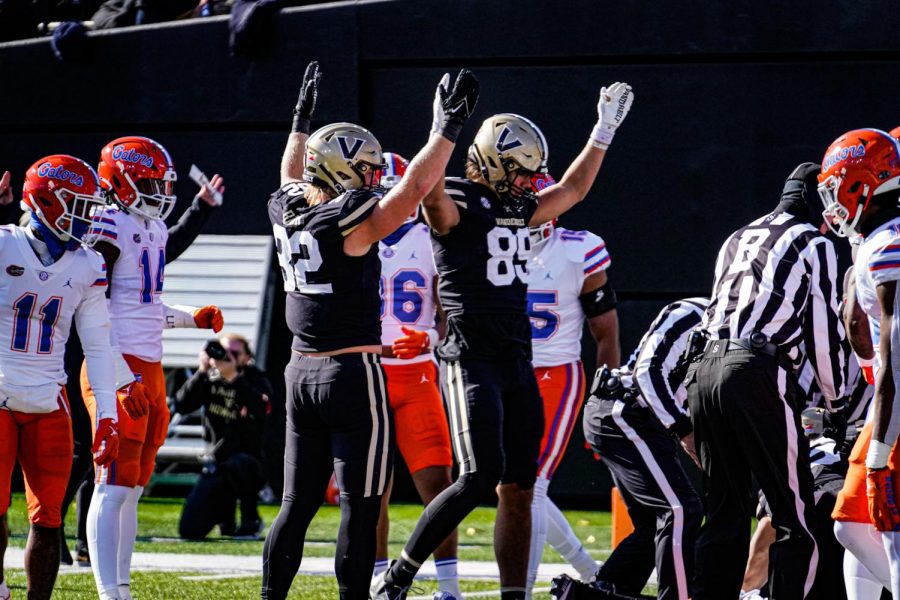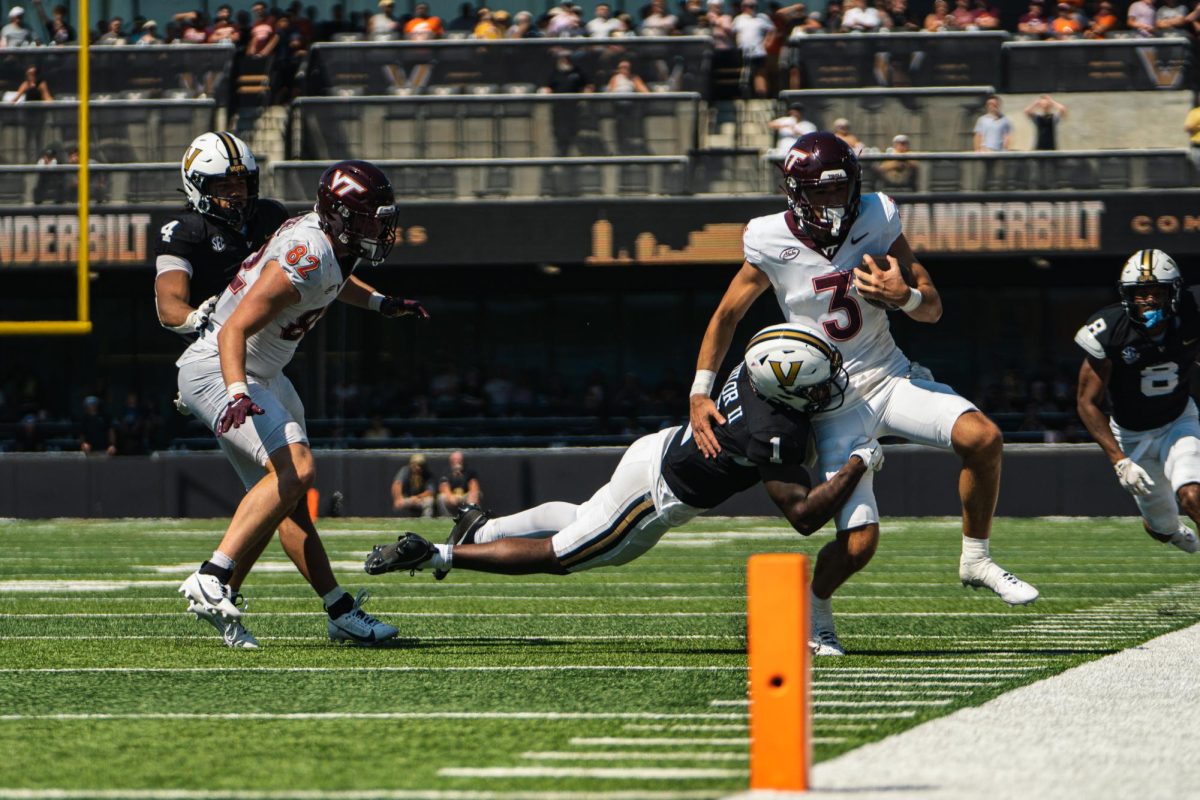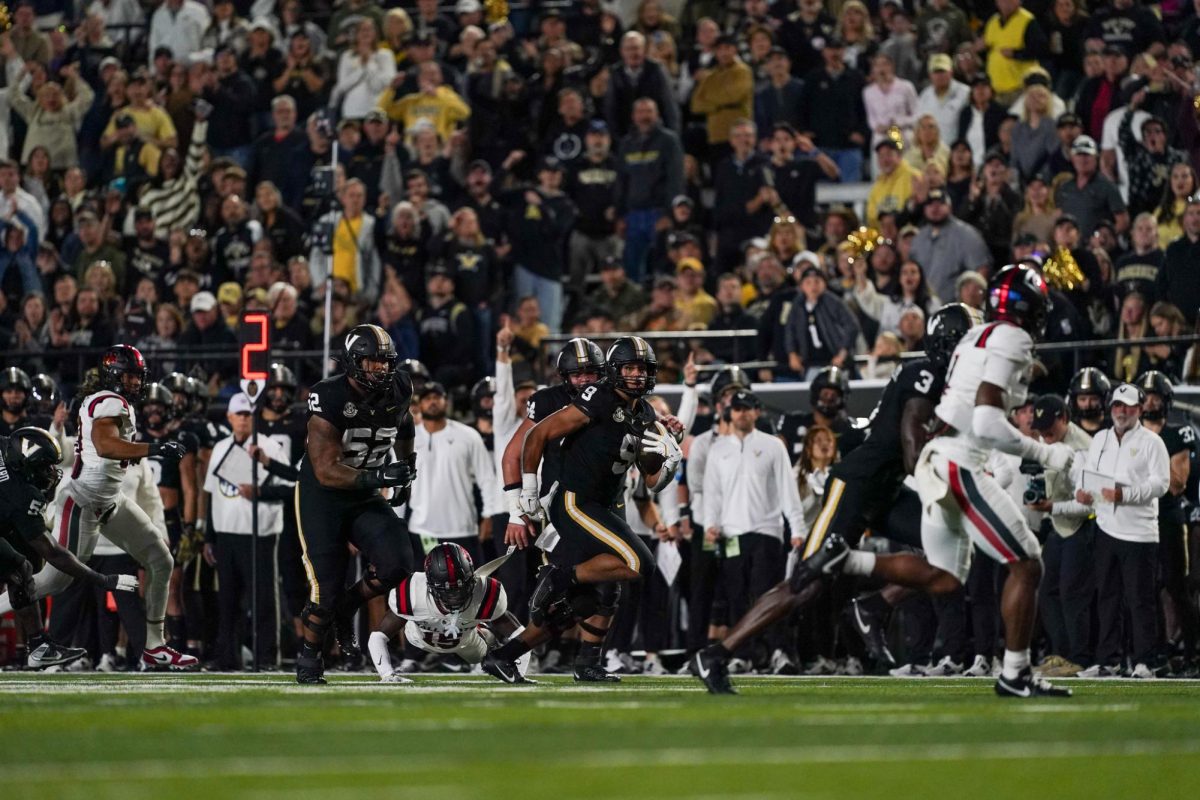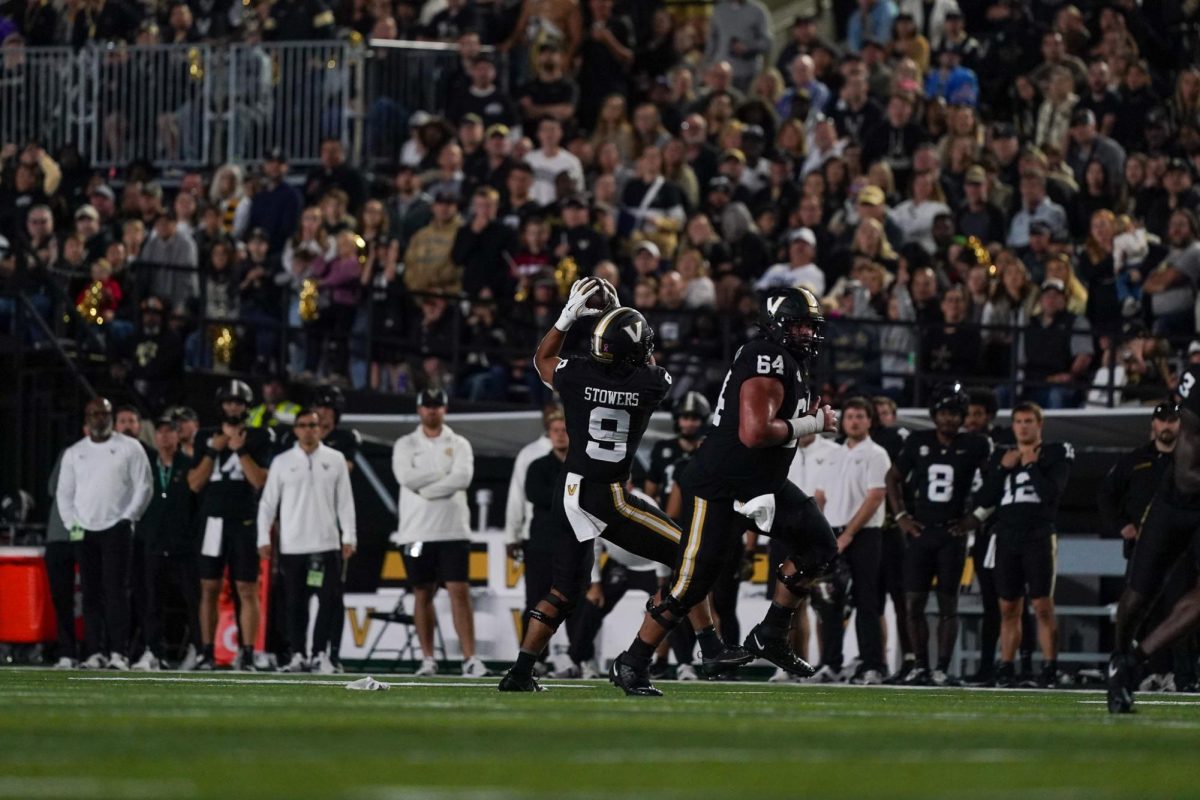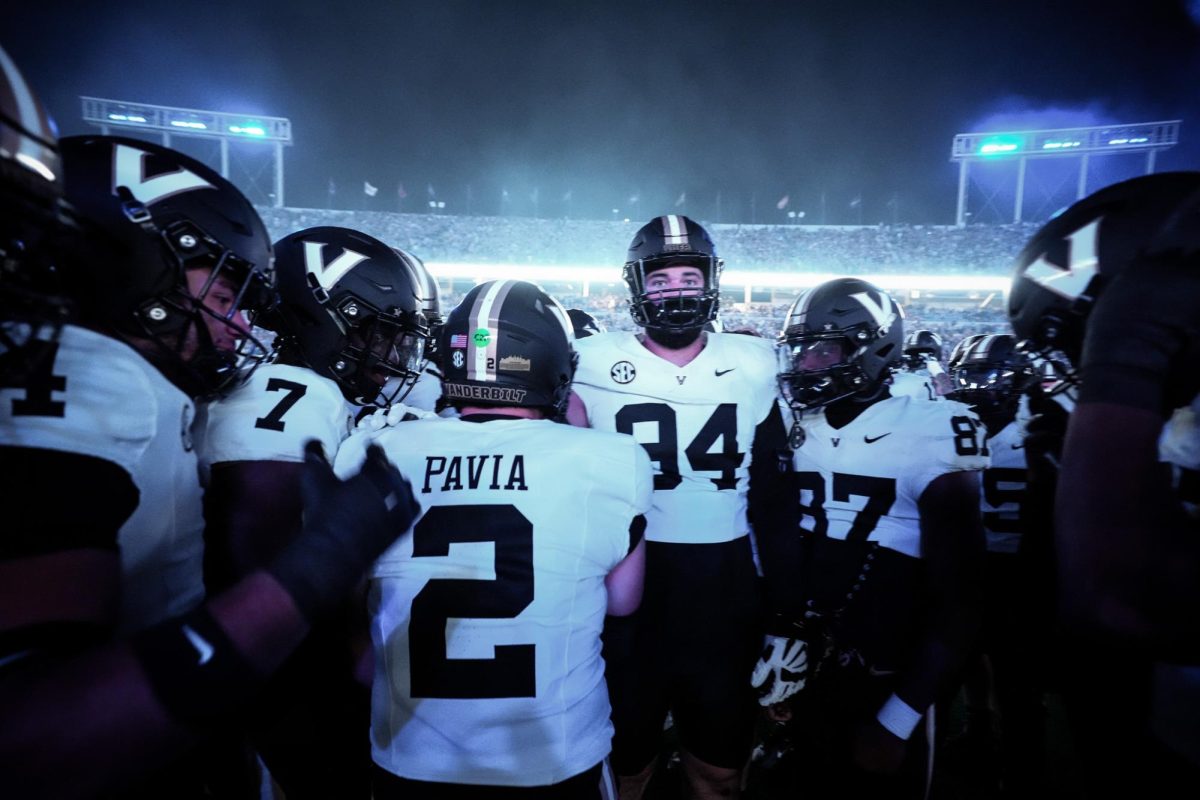After watching the Commodores lose their first five SEC games, it was fair to wonder if this season would bring anything other than the disappointment and embarrassment that had become synonymous with Vanderbilt football. The Commodores raced out to a surprising 3-1 start, offering hope that Clark Lea’s purported turnaround was in full swing. But over the ensuing five games, sloppy performances on both sides of the ball, a suspended assistant coach and an injured quarterback all but erased any aspirations for a bowl game. Or so we all thought.
Against all odds, the Commodores upset the then-No. 24 Kentucky Wildcats on the road and pounded the Florida Gators at home to throw the SEC standings into chaos. At 5-6, Vanderbilt has a real chance to make a bowl game, although their APR ranking isn’t doing them any favors. This all begs the question: What spurred this remarkable turnaround?
The return of quarterback Mike Wright to the starting lineup has reinvigorated an offense that had grown stale against the SEC’s best. Wright began the season with a torrid start, generating 638 yards of total offense and 10 touchdowns while looking like one of the top dual-threat quarterbacks in the nation. But after an atrocious performance against Wake Forest coupled with the emergence of now-QB1 AJ Swann, Wright was relegated to backup status for conference play. With Swann sidelined against Kentucky, Wright snatched back the keys to the offense and literally ran with them.
But it’s not just Wright who deserves credit for the Commodores’ abrupt turnaround. Vanderbilt simply looks like a different football team than they did in October in every facet of the game. The offensive line, which was maligned in the beginning of the season for poor protection and run-blocking, has transformed into a strength for the team. The defense, which struggled with tackling and blown coverages all season, looks more confident than ever. Last week against Florida (third in SEC in rushing yards per game), the Commodores held the Gators to just 64 rushing yards, well below their season average of 209.
With two program-defining wins in consecutive weeks, coach Lea was adamant in his belief the new-look Commodores are here to stay.
“I can’t say enough about this being a new era in Vanderbilt football,” Lea said after the win against Florida, “ [Today] is a point that we’ll look back on and see where the shift happened”
Simplified offense
For the first nine games of the season, Vanderbilt’s offense was slowed by inconsistent and overcomplicated play-calling. Despite the presence of elite playmakers like Ray Davis, Will Sheppard and Jayden McGowan, offensive coordinator Joey Lynch struggled to create consistent opportunities for his best players. Consequently, Swann and Wright rarely found a continuous rhythm moving the ball downfield and lacked a safety net while being pressured. In the last two games against Kentucky and Florida, something changed.
Improved play from the offensive line has led to better running lanes for Davis, opportunities that the punishing back has attacked in stride. Earlier this year, I highlighted Davis as the top rusher in a deep backfield, a home-run threat capable of handling a lead back’s workload. He’s backed up expectations, especially over the last few weeks. Davis is third in the SEC in rushing yards this season (982), with an average of 139 rushing yards per game on 25 carries over his last 3 appearances.
Against Kentucky, Davis provided a much-needed offensive spark in the second half with a 45-yard scamper to bring the Commodores into the redzone. Besides Davis’s excellent vision and execution, the well-designed blocking scheme stands out on this play. Tight end Gavin Schowenwald goes into motion pre-snap and creates a massive hole for Davis to burst through, and McGowan adds in a nice block downfield. Two plays later, Davis would find paydirt on a 1-yard rushing score. Davis continued to feast on new rushing opportunities against Florida, including the next two plays. Better blocking schemes lead to more space for Davis to operate, giving him the room to beat defenders with an array of gravity-defying moves.
Screen plays were another method used to create opportunities for Davis, a strategy which proved highly effective for other open-field weapons. On a play designed to appear as an end-around to McGowan, Wright finds Davis with ample space to beat a defender and pick up the first down. Quick, confidence-building throws like screen passes allow Wright to find a rhythm and create sustainable momentum for the offense. Wright’s first passing touchdown of the game came on a well-designed passing play to McGowan on an in-route for an untouched score. Justin Ball cuts up to draw the safety away from the middle of the field, leaving McGowan completely uncontested on the inside for an easy throw from Wright.
The offensive scheme also made Wright’s job easier with the use of designed roll-outs, plays in which Wright intentionally leaves the pocket to lure pass-defenders away from receivers. This concept is apparent on touchdowns to Schowenwald and Ben Bresnahan. The linebackers assigned to cover these tight ends must also key onto Wright in case he runs the football, and their hesitation gives the target time to break free.
To beat Kentucky and Florida, Lynch simplified his offense to maximize targets and playmaking opportunities for his most skilled players. As a result, we’ve been able to see the heights Wright can carry this team when the system is catered to his strengths.
Improved defense
Vanderbilt’s greatest defensive weakness remains the same: a suspect secondary giving up the second most passing yards per game in Division 1 football. While the Commodores held Kentucky quarterback Will Levis to one of his worst performances of the season (109 passing yards, 1 interception), they gave up a disappointing 400 passing yards to Florida. Even so, the defense looks markedly improved from where it stood just a few weeks ago. Outside of a few blown plays leading to deep touchdowns, the Commodores matched up well against two SEC offenses and found a way to consistently exploit their weaknesses. Against Kentucky, the Commodores applied constant pressure to Levis, sacking him four times and hampering the passing game. Against Florida, linebackers CJ Taylor and Anfernee Orji patrolled the flats and shut down the Gators’ rushing attack with the help of their defensive line.
Improved defensive schemes played a huge role in sharpening the Commodores’ pass rush against Kentucky. On 3rd-and-7, defensive coordinator Nick Howell calls a blitz for Taylor, who fills in the ANCHOR position for Vanderbilt as a linebacker/safety hybrid. Taylor beelines to a surprised Levis to pick up the sack and force Kentucky to settle for a field goal. Vanderbilt’s most important sack against Kentucky came on the Wildcat’s final offensive drive. With added pressure from a blitzing Orji, tackle Christian James was able to slip through the line and sack Levis with just nine seconds left in the game.
The defense built off the momentum from beating Kentucky to put forth its best collective effort of the season against Florida. The defensive line continued to win the battle in the trenches, which led to a huge stop in the red zone to force a field goal on the Gators’ first drive. While the Commodores didn’t record any sacks against Florida, they maintained steady pressure on quarterback Anthony Richardson to force key mistakes. On 3rd-and-10, Richardson throws to avoid a sack, but Jaylen Mahoney scoops the bobbling ball away from a Florida receiver for Vanderbilt’s only interception on the day.
The effectiveness of Vanderbilt’s run defense translated to fewer opportunities in the passing game for Florida. However, Richardson was able to beat Vanderbilt over the top for a few huge yardage completions, including a 74-yard bomb resulting from a blown assignment. On the whole, Vanderbilt’s defense looks much more comfortable and has found a replicable formula to slow down opponents on the ground and through the air.
Special teams
Vanderbilt’s consistency on special teams has been underappreciated all season. Finally, after contributing a few huge plays against Florida, the Commodores’ most unsung unit gets their Film Room flowers. McGowan chipped in two huge kick returns to allow Vanderbilt to start its drives closer to midfield. Punter Matt Hayball continued his excellent play; he currently sits at 17th in the nation in average punt distance (45.9 yards). But, the undisputed special teams highlight on the day came at the hands of long snapper Wesley Schelling, who recovered a muffed punt in the endzone for a Vanderbilt touchdown. This decisive score put the Commodores up 14-6, a comfortable lead that would not be relinquished for the remainder of the game.
Reliability on special teams affords Vanderbilt greater control over its field position, a pivotal difference-maker in close games. When vengeful No. 9 Tennessee rolls into Nashville on Saturday, the Commodores will need more than superlative punt coverage to beat the Volunteers. Doing so will require the aggressiveness on offense and consistency on defense that Vanderbilt discovered in defeating Florida and Kentucky. On Saturday, the Commodores will have the chance to show just how badly they want a bowl game.
Vanderbilt will host Tennessee on Saturday, Nov. 26, at 6:30 p.m. CST at FirstBank Stadium.

